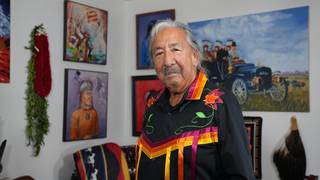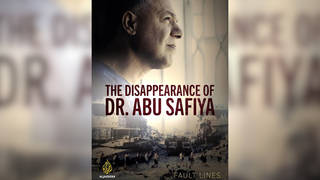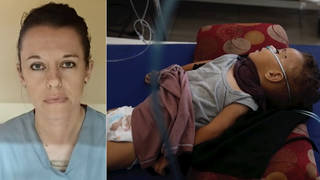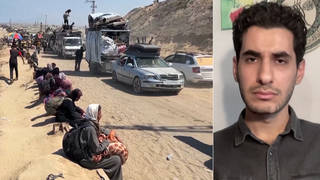
As friends and family mourn the killing of Turkish American activist Ayşenur Ezgi Eygi by Israeli forces in the occupied West Bank, we speak with the parents of Rachel Corrie, another American killed while volunteering with the International Solidarity Movement to protect Palestinians from attacks and displacement. Corrie was just 23 years old when she was crushed to death by an Israeli military bulldozer in Gaza in 2003 as she attempted to use her body to stop the destruction of Palestinian homes. Cindy and Craig Corrie have since devoted their lives to their daughter’s cause and founded the nonprofit Rachel Corrie Foundation for Peace and Justice. They say the news of Eygi’s death brought back painful memories. “It thrusts us back to that moment on March 16, 2003, about noon, when we were in Charlotte, North Carolina, and got the word about Rachel,” says Cindy Corrie. “It’s a parent’s nightmare.” Craig Corrie echoes calls by Eygi’s family for an independent probe into her killing. “Israel does not do investigations; they do cover-ups.”
Transcript
AMY GOODMAN: I want to turn right now to a family that knows the pain of a daughter’s death. Ayşenur Eygi had been volunteering with the International Solidarity Movement, or ISM, to try to protect Palestinians from attacks by the Israeli military and settlers. That’s the same group that Rachel Corrie, also a U.S. citizen — she was a student at Evergreen College in Washington, in Olympia. She was volunteering with ISM in 2003 when she was crushed to death. It was actually three days before the U.S. invaded Iraq. It was March 16, 2003. She was crushed to death in Gaza by an Israeli military bulldozer. She was trying to protect the home of a Palestinian pharmacist’s family in Rafah that was about to be demolished. She was 23.
We’re joined right now by Rachel’s parents, Cindy and Craig Corrie. After Rachel was killed, they devoted their lives to her cause, founded the nonprofit Rachel Corrie Foundation for Peace and Justice. Cindy is the foundation’s president; Craig, the treasurer. They’ve also gone on interfaith peace missions to Israel, to Gaza and the West Bank.
Welcome back to Democracy Now!, Cindy and Craig. I remember seeing you at Evergreen College. It was the largest graduation Evergreen ever had, in Olympia, that year, 2003, but it was missing one student who was supposed to have graduated, your daughter Cindy, who was killed in Rafah. When you heard this news of Ayşenur on Friday, I was wondering your response. And if you can talk about what you see as the parallels?
CINDY CORRIE: Thank you, Amy. And thank you to all of your guests who have shared this very tragic story.
We learned, we started to get word about what had happened to Ayşenur on Friday morning. And it was, of course, very disturbing and emotional for us. I think, for me, you know, it thrusts us back to that moment of March 16th, 2003, about noon, when we were in Charlotte, North Carolina, and got the word about Rachel. And I remember, you know, just the horror and the pain of that news. And so, for me, on Friday morning — I remember wondering, you know: Would I ever feel whole again? Would I ever be the same person again? Could I ever enjoy life? I mean, it’s a parent’s nightmare. And so, Friday morning, knowing that there was another family so nearby, in Seattle, who was getting that same kind of news was just very, very disturbing. And we continue to just feel deeply about what that family is experiencing right now.
AMY GOODMAN: Craig, if you can tell us — I mean, we actually just recently spoke to the two of you. You also called for an investigation. What ultimately came of the death of Rachel Corrie, killed by an Israeli military bulldozer, which was a Caterpillar bulldozer?
CRAIG CORRIE: Well, of course, we did call for a U.S. investigation into Rachel’s killing. Let me say that what we’re hearing today, it’s upsetting to our family to hear our State Department again, and I would expect them to say, that they are trying to find out the facts and looking to Israel for that. Israel does not do investigations; they do cover-ups. So, let’s face it, nothing’s going to come out of there that’s going to help these citizens or whoever may be killed in the future. That’s what we’re trying to stop. Our family worked for an investigation into Rachel’s killing, and we wanted some consequences out of that. And we hoped — even though we didn’t know the names of the people that would be killed in the future, we hoped that that would stop and it would not happen.
I think, at this point, yes, U.S. has to do an investigation, but there needs to be consequences. As Jonathan pointed out, these are American weapons that are being used. That’s against U.S. law, and it should be stopped. I know from working with members of Congress and their staff, working with the State Department, that under the Leahy Law, usually they’re asking for proof that it was a U.S. weapon. If I write a check, I don’t need proof about what’s going wrong. I need people to cooperate and determine that it’s not our money that’s being used that way. Israel does not do that, to my knowledge. So, we also need to look for international help here. I think that the U.N., the International Criminal Courts, they’re places that need to get involved. But we’re just sick and tired of hearing platitudes from the State Department. And these are people we’ve met. We have met with Antony Blinken before he became secretary of state. He’s a decent person. But there needs to be consequences, and there needs to be consequences that are enforced by the entire U.S. government and the international community.
CINDY CORRIE: We heard those words that we hear so often when something like this happens, that the U.S. had asked for a thorough, credible, transparent investigation. We did pursue help from the State Department, from our government, and we kept pursuing that help for many years. And, you know, we were still getting statements in — I believe it was 2008 from the State Department. Michelle Bernier-Toth wrote to us about how many people in the administration at that time had spoken to their counterparts in Israel about a thorough, credible and transparent investigation for Rachel’s case. And she — these were people like Secretary of State Colin Powell talking to his counterpart, a long list of names that you would recognize. And at the close, she said those requests go unanswered or ignored.
And when you think about what we’re doing, what we’re supplying to the Israeli military, to the Israeli government, the kind of backing that’s being given to them, it’s really — it was just really shocking that there would be this verbal request for accountability, or at least for an investigation, on the part of Israel. But the U.S. acknowledged that that hadn’t happened. And in fact, now-Secretary of State Tony Blinken in 2010 confirmed for us that the position of the U.S. government in Rachel’s case remains that there has not been a thorough, credible and transparent investigation in her case.
Also, the U.S. — we fought for investigation for years, U.S. investigation. There’s a very — we were told there’s very limited statute that allows for that to happen in the U.S. The Justice Department and FBI, apparently, ultimately, looked for that possibility. But we were told that policy impacts whether they take that on, and that even if there were investigation, prosecution of someone would be extremely unlikely through the U.S. So it’s one of the reasons that we are saying there needs to be an international element here, an international commitment to ensuring that an unbiased investigation happens, that an impartial investigation happens.
We ultimately went to the Israeli courts, which we learned are also implicated in furthering Israeli policy and occupation. And we heard the lead investigator, who completed the military investigation — and it’s important for people to understand Israel’s investigations are military investigations. It became clear that that was conducted in order to exonerate the Israeli military, not to find truth and what really happened. And that’s what our family was pursuing. But the lead investigator stated under oath in Haifa court that he believed that they were at war with everyone, including the peace activists from the International Solidarity Movement. I think that’s really important information for people to understand now as we move forward in this tragic case.
AMY GOODMAN: I want to end with the words of Congressmember Pramila Jayapal of Washington, who’s head of the Congressional Progressive Caucus, the largest caucus in Congress, on the killing of the Turkish American activist Ayşenur Ezgi Eygi. She said, “I am very troubled by the reports that she was killed by the Israeli Defense Forces (IDF) soldiers. The Netanyahu government has done nothing to stop settlement expansion and settler violence in the West Bank, often encouraged by right-wing ministers of the Netanyahu government. The killing of an American citizen is a terrible proof point in this senseless war of rising tensions in the region,” she said.
I want to thank you all for being with us, Rachel’s parents, Cindy and Craig Corrie, speaking to us more than two decades after Rachel was killed by an Israeli military bulldozer in Gaza near Rafah. I want to thank Amado Sison, Filipino American shot in the leg by Israeli forces a month ago today in Beita, where Ayşenur was also killed. Juliette Majid, Ph.D. student, North Carolina State University, speaking to us from Raleigh, dear friend of Ayşenur Eygi at the University of Washington, where they both graduated.
Coming up, we look at the raids in Jenin. We’ll speak with the Palestinian journalist Mariam Barghouti. Stay with us.











Media Options